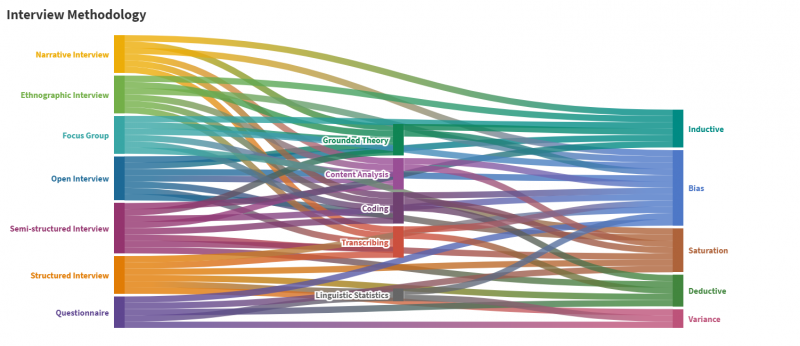Difference between revisions of "Interviews"
| Line 2: | Line 2: | ||
__NOTOC__ | __NOTOC__ | ||
== How to find the proper Interview method == | == How to find the proper Interview method == | ||
| − | + | You may have decided that you want to ask people things for your research, but you don't quite know which approach to choose.<br> | |
| − | |||
| − | |||
| − | |||
| + | '''We thought about this, and we decided that in the end, it comes down to two things:''' | ||
| + | * ''Do you want qualitative or quantitative insights?'' | ||
| + | ** Do you plan to go into depth with fewer individuals, and understand their worldviews? | ||
| + | ** Or are you interested in larger numbers of responses which you can calculate with, or in gathering quantitative responses right away, e.g. on a Likert Scale? O | ||
| + | * ''Do you want interactive or non-interactive Interviews?'' | ||
| + | ** Interactive means that you maintain control over the Interview conduction, with pre-determined questions and a strong impact on the questions that individuals respond to. | ||
| + | ** Non-interactive means that you rather observe and listen. You have some things you are interested in, but you also want to let the Interviewees speak freely.<br> | ||
| + | |||
| + | '''If can decide on these two questions, choose the appropriate Interview method from the following table'''. You can also have a quick look into the respective entry to check if this is really what you are looking for.<br> | ||
| + | {| class="wikitable" | ||
| + | |- | ||
| + | ! Interview Method !! Short description !! Qualitative or Quantitative? !! Interactive or non-interactive? | ||
| + | |- | ||
| + | | [[Open Interview]] || Open, unstructured conversations with individuals || Qualitative || Non-interactive | ||
| + | |- | ||
| + | | [[Narrative_Research#Narrative_Interviews|Narrative Interviews]] || Open Interviews with a focus on the creation of narratives through the Interviewee || Qualitative || Non-interactive | ||
| + | |- | ||
| + | | [[Ethnography#Observing_&_Interviewing|Ethnographic Interviews]] || Open Interviews conducted in the field during Ethnographic Research || Qualitative || Non-interactive | ||
| + | |- | ||
| + | | Example || Example || Example | ||
| + | |- | ||
| + | | Example || Example || Example | ||
| + | |- | ||
| + | | Example || Example || Example | ||
| + | |} | ||
Revision as of 08:49, 26 May 2021
This page provides an overview on all entries that relate explicitly to Interview methodology.
How to find the proper Interview method
You may have decided that you want to ask people things for your research, but you don't quite know which approach to choose.
We thought about this, and we decided that in the end, it comes down to two things:
-
Do you want qualitative or quantitative insights?
- Do you plan to go into depth with fewer individuals, and understand their worldviews?
- Or are you interested in larger numbers of responses which you can calculate with, or in gathering quantitative responses right away, e.g. on a Likert Scale? O
-
Do you want interactive or non-interactive Interviews?
- Interactive means that you maintain control over the Interview conduction, with pre-determined questions and a strong impact on the questions that individuals respond to.
- Non-interactive means that you rather observe and listen. You have some things you are interested in, but you also want to let the Interviewees speak freely.
If can decide on these two questions, choose the appropriate Interview method from the following table. You can also have a quick look into the respective entry to check if this is really what you are looking for.
| Interview Method | Short description | Qualitative or Quantitative? | Interactive or non-interactive? |
|---|---|---|---|
| Open Interview | Open, unstructured conversations with individuals | Qualitative | Non-interactive |
| Narrative Interviews | Open Interviews with a focus on the creation of narratives through the Interviewee | Qualitative | Non-interactive |
| Ethnographic Interviews | Open Interviews conducted in the field during Ethnographic Research | Qualitative | Non-interactive |
| Example | Example | Example | |
| Example | Example | Example | |
| Example | Example | Example |
What to do when conducting Interviews
After choosing an appropriate method, there are a few things to consider.
We created this interactive Sankey diagram to show you which other Wiki entries you might be interested in for the analysis (central column) and interpretation (right column) of the results from your specific Interview approach (left column). The diagram is clickable - just pick a topic to learn more about.
DIAGRAM COMING SOON
